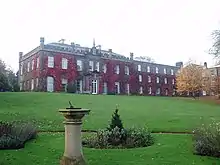Samuel Stretton (1731 – 11 May 1811) was a builder and architect in Nottingham[1] who is noted for building the first powered cotton mill.
Family
He appears to have been born at Longdon Staffordshire in 1731 or 1732 and moved to Lenton in 1750, where he was married and where all his children were baptized.
On 14 July 1754 he married Elizabeth Wombwell in Lenton. The marriage produced 6 children:
- William Stretton April 1755 – 12 March 1828
- Ann 1757 – 11 April 1820
- Elizabeth 1759
- Mary 1760
- Samuel Stretton 1761
- Sarah 1763
His wife Elizabeth died on 22 February 1802 and was buried at Lenton. He died on 11 May 1811, and was buried on 16 May at Lenton.
Career

Lenton Hall built in 1792, now part of Hugh Stewart Hall at the University of Nottingham
He carried on the business of a builder to Nottingham, at first on his own account, and later in partnership with his son William Stretton,
Buildings by Samuel Stretton include:
- 1769–1772 the first powered Cotton Mill erected in England, driven by horses turning a capstan.[2]
- 1776 Colwick Hall[3]
- 1777 the Grand Stand on Nottingham Racecourse.[4]
- 1789 Nottingham Town Jail.[5]
- 1792 Evans, Storer and Green Brewery, Poplar Place, Lenton, Nottingham[6] at a cost of £15,000 (equivalent to £1,833,387 as of 2021),[7]. This brewery only survived for two years.
- 1792 Lenton Hall, now part of Hugh Stewart Hall at the University of Nottingham.
References
- ↑ The Stretton Manuscripts, being notes on the history of Nottinghamshire by William Stretton (Of Lenton Priory) Died 1828. Nottingham. Privately Printed. 1910
- ↑ The Arkwrights, spinners of fortune. R. S. Fitton. 1989. p.27
- ↑ Nottingham Date-Book, under the year 1776, states “Colwick Hall, near this town, was built about this period by Mr. S. Stretton, of Nottingham, under the direction of Mr. John Carr, of York, architect.”
- ↑ Nottingham Date Book. John Frost Sutton. P.115
- ↑ Nottingham Date Book. John Frost Sutton. P.183
- ↑ British Breweries: an architectural history. Lynn F. Pearson
- ↑ UK Retail Price Index inflation figures are based on data from Clark, Gregory (2017). "The Annual RPI and Average Earnings for Britain, 1209 to Present (New Series)". MeasuringWorth. Retrieved 11 June 2022.
This article is issued from Wikipedia. The text is licensed under Creative Commons - Attribution - Sharealike. Additional terms may apply for the media files.